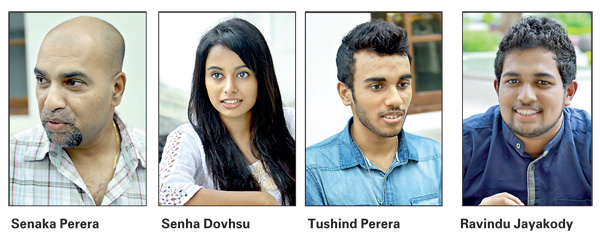News
Roar of approval for capital punishment

Chandana
Ninety per cent of people in the street approve of President Maithripala Sirisena’s proposal to reactivate capital punishment to contain the rising crime rate. Civil society and anti-drug addiction groups disagree, pointing out that the death penalty alone would not deter crime nor reduce the smuggling of drugs into the country.

Dr Nihal Rathnayake
While many argued that punitive punishment would act as a caution to would-be offenders, others said it would only net small-scale drug dealers while major dealers would escape with the help of powerful politicians. Alcohol and Drug Information Centre Executive Director Pubudu Sumanasekera said there was no scientifically-based evidence that capital punishment acted as a deterrent to crime. “This is not an option. We believe in prevention, treatment and rehabilitation,” he said.

Goln
Human rights activist and a member of the Lawyers for a Just Society Shiral Laktilake claimed no country that had brought in the death penalty could say that its crime rate had decreased. Sri Lanka Anti-Narcotics Association (SLANA) Executive Director Dharshini Guniyangoda said it was important to look at the demand and supply chain in controlling drugs. If there was a reduction in demand the supply chain would die a natural death. For this purpose she called on the government to ensure that law enforcement authorities carried out their duties without interference.

Justice Minister Wijedasa Rajapaksa said that the President’s proposal was prompted by public pressure to lift the moratorium on judicial executions. He said that despite a call from the European Union to abolish capital punishment he would go ahead if Sri Lankan society was in favour of its reintroduction. “Many countries in Asia, including Indonesia and Thailand, have capital punishment,” he pointed out.
Justice Ministry Secretary Kamalani de Silva said the ministry was awaiting public opinion in order to send in a recommendation to the President. She said the government will not carry out a survey on the matter but would depend totally on the media to feel the pulse of the people. “We depend on the media to have the public’s say on the matter,” she said.
Sri Lanka is a signatory to the Universal Declaration to Human Rights adopted by the United Nations General Assembly in 1948 that advocates the right of protection of life. Successive governments have tried to re-enforce hanging and have failed. Former president Chandrika Kumaratunga made four attempts between 1995 and 1999 to reintroduce the death sentence. Sri Lanka has not carried out executions since June 1976.
Since then, 342 criminals, including 11 females, have been on death row. Another 581 prisoners including 19 women who have been condemned to death are appealing their sentences. Altogether, 16 males and three females have been condemned for drug smuggling.
South Asian governments are going back to judicial execution in an attempt to curb crime waves in their countries. India recently bowed to public pressure and proposed the death penalty although only in extreme brutal cases of sexual assault following the infamous gang-rape of a young woman on a New Delhi bus in 2012. Pakistan reintroduced the death penalty in 2013, ending a five-year moratorium. Indonesia and Thailand continue with execution of condemned prisoners.
| Life or death? What they said Vox pops carried out in the street found these views on the President’s proposal to get the death penalty in operation to fight serious crime: “It is a good thing and will stop rapists and drug dealers from operating. They should be punished.” Sneha Devesundera, 20, international affairs student“I am not for it. It is too great a punishment. They have a right to live. By introducing death sentence the government is also doing the same – killing people. What they need is imprisonment and rehabilitation. Also, bringing in the death penalty will affect our relationship with the United Nations and the European Union.”Ravindra Jayakody, 19, international affairs student “Good work. This means freedom for our society. Drug dealers, murderers, underworld gangs and white collar criminals all have to face this.”Dr. Nihal Jayatilake Jayatilleke, 59, social scientist and author “Re-introduce hanging. This will stop the crime rate. Life sentences are not suitable. [Criminals] are having a life of luxury inside prisons. What’s more, they come out and return to their old way of life.” Senaka Perera, 53, executive chef working in the Maldives “Indonesia has capital punishment and so do the Middle Eastern countries. We should introduce the law. People are getting away with crime. This will control the crime rate in the country.Kushinda Perera, 19, mechanical engineering student, American National College, Colombo “The crime rate in the country has increased. They should be hanged in public. The law enforcement authorities, however, have to function properly: the big fish do not get caught, only the small dealers fall in the net.” Gopi Kithnasamy, 40, physiotherapist, Durdans Hospital, Colombo “The crime rate is increasing and criminals should be punished. This will make them think before committing a crime.” Chandra Ratnayake, 34, air force service agent working in Kuwait. | |
| Mercy list still being compiled Justice Ministry Secretary Kamalini de Silva said the process of commuting death sentences to life imprisonment would continue despite the current move to introduce capital punishment and a list of prisoners’ names would soon be presented to President Maithripala Sirisena.“He has to decide who is eligible to have their death sentence commuted,” she said. A 10-member committee headed by retired justice P. Edirisooriya along with officers from the Attorney-General’s office, the Justice Ministry and the Prisons Department, a High Court judge, university professors and a mental health doctor review the files of condemned prisoners.“We meet every Monday afternoon and review three to four files a day,” Ms de Silva said. According to prisons statistics there are 942 condemned prisoners awaiting hanging. The committee, which started work in October 2013, has reviewed around 200 cases. Ms de Silva said it experienced much difficulty in obtaining relevant files from the courts. | |

